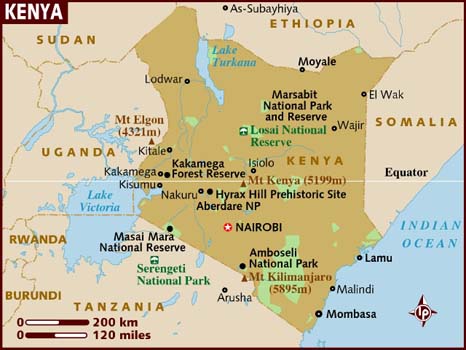Kenya is US’s Africa policy anchor
December 14, 2018 | Expert Insights

Kenya will reportedly be named an “anchor” country when the Trump administration unveils its Africa policy.
Background
Kenya is a country in Africa with its capital and largest city in Nairobi. Kenya's territory lies on the equator and overlies the East African Rift, covering a diverse and expansive terrain that extends roughly from Lake Victoria to Lake Turkana and further south-east to the Indian Ocean.
Kenya gained independence in December 1963 but remained a member of the Commonwealth of Nations. In relative terms, it has been relatively stable and democratic in the ensuing decades, albeit intercepted by periods of authoritarianism and political violence, most recently in 2007. Following a referendum in August 2010 and the adoption of a new constitution, Kenya is now divided into 47 semi-autonomous counties governed by elected governors.
Kenya's economy is the largest in eastern and central Africa, with Nairobi serving as a major regional commercial hub. Agriculture is the largest sector; tea and coffee are traditional cash crops, while fresh flowers are a fast-growing export. The service industry is also a major economic driver, particularly tourism. Kenya is a member of the East African Community trade bloc, though some international trade organisations categorise it as part of the Greater Horn of Africa.

Analysis
National Security Advisor John Bolton, known for his hard-line foreign-policy views, is set to outline a new approach to Africa that puts emphasis on countering perceived threats to US interests on the continent, posed in particular by China.
The Trump team’s initiative is said to entail efforts to enhance relations with Kenya and other African countries viewed as regionally important and as prime targets of China’s moves to gain political and economic advantages on the continent.
“The White House strategy is expected to name several countries as anchors for the US strategy, and experts close to the administration expect the list to include Kenya, a longstanding US ally,” NBC News reported on Monday.
Mr. Bolton, a former US ambassador to the United Nations, will present the long-awaited Africa blueprint in a speech at the Heritage Foundation, a Washington think tank generally supportive of President Trump’s policies. Joshua Meservey, the Heritage Foundation’s Africa specialist, said in an email on Tuesday that US corporations will be encouraged to invest in select African countries.
“I expect that part of operationalising enhanced relationships with countries will include trying to facilitate, in various ways, US companies’ greater involvement in Africa,” Mr. Meservey told the nation. “I expect Ambassador Bolton will reaffirm the administration’s recognition of geopolitical competition as the most urgent challenge to US interests,” Mr. Meservey added. “In the Africa context, that means responding especially to China, but also Russia, Iran and the DPRK [North Korea].” The Trump approach is also expected to give lessened importance to counter-terrorism operations in Africa, which has been the centrepiece of Washington’s approach to the continent in the 21st century.
US military assistance to Somalia is thought likely to be sustained in the new policy. This new policy intended to demonstrate the Trump administration engagement with Africa as the continent had been treated for many months as an afterthought in US global calculations. Mr. Trump expressed his dismissive view early this year by using a vulgar term to describe African countries. And in a meeting with several African leaders last year, he referred to Namibia as Nambia.
The new policy will, however, not include additional funding for aid, diplomacy or intelligence-gathering, NBC News reported. The plan will also not involve heightened US attention to human rights issues in Africa. This will likely lead critics in Congress to argue that the Trump approach resembles China's hands-off posture in regard to repressive practices by the African governments it is courting.
Assessment
Our assessment is that the US is acknowledging the importance of Africa in combating terrorism and threats to peace and security by revamping its investment policies. We believe that the Trump administration is forging an Africa policy much like President Obama’s famed “Asian Pivot”. We also feel that the US is looking to counter growing Chinese influence over Africa by providing investments programs.








Comments